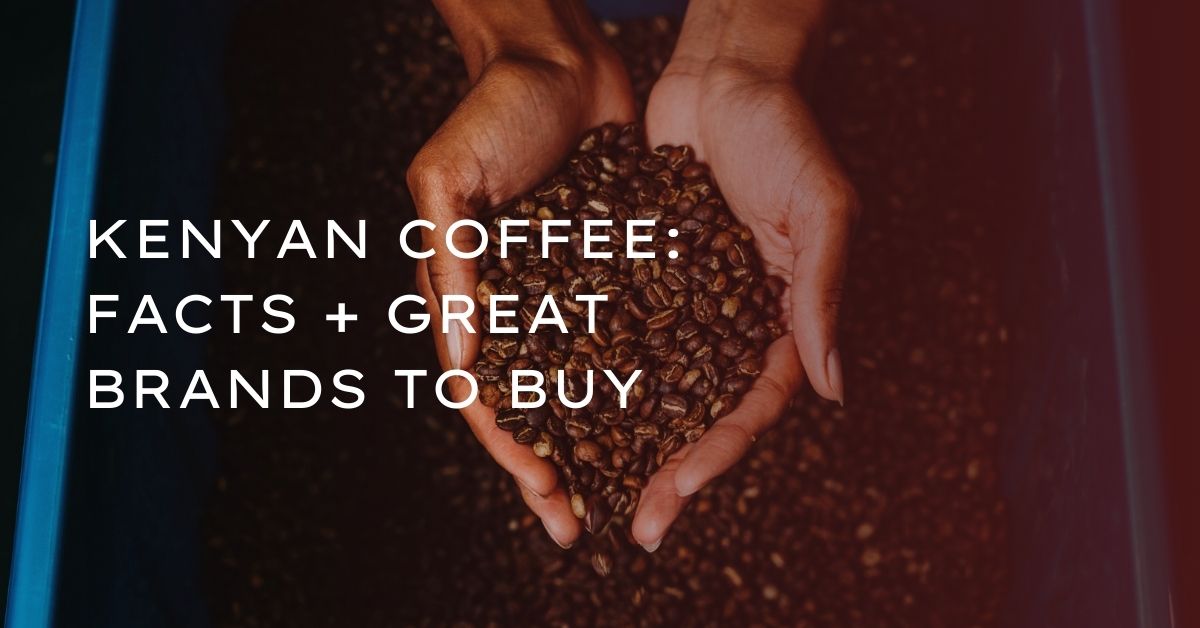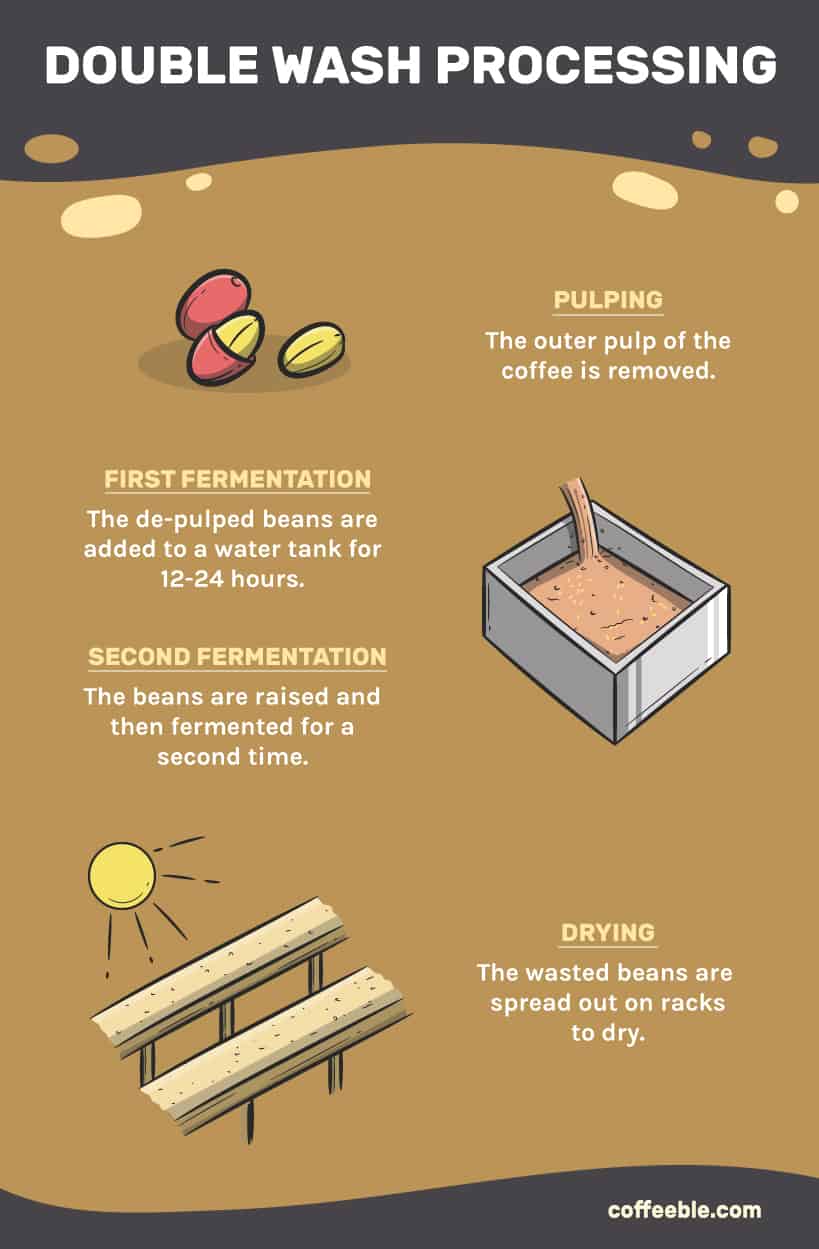When speaking about the best coffee-growing regions in the world, Kenya has to be on the list. It only produces a small amount of coffee compared to the big exporters. Yet, the connoisseurs highly revere its produce!
If you’re curious as to why these coffee beans have such a great reputation, we’ve put together some of the most important things to know about the country and its coffee. Read on for how to select the top Kenyan beans.
At A Glance:
- Only the Best Kenya AA Coffee Beans: Screen 18
- Hand-harvested from the Slopes of Mt Kenya: Volcanica Peaberry
- Floral Flavors from Small Family Farms: Fresh Roasted Coffee
The Best Kenyan Coffee Brands in 2022
The good news for coffee drinkers is that most of the coffee Kenya harvests is produced for export. So although the quality of the beans makes them highly sought-after, they’re also readily available. You’ll even find a Kenyan blend at your local Starbucks. But if you want to know why Kenya is said to produce some of the best coffee beans in the world, try one of these selected brands.
1. Screen 18 Kenyan AA Single Origin Coffee
Specifications
Bean type: Arabica
- Best for: French press
- Ground or whole: Whole bean
The brand gets its name from the grading screen used to sort coffee beans by size. They source beans from all around the world that fit into this grade, including Costa Rica and Ethiopia. This screen size is equivalent to the Kenya AA grade coffee, so that’s exactly what we find here. Kenyan beans are often light or medium roast, but these have been treated with a medium-dark roast. Yet you’ll still find some of the wine-like acidity that Kenya coffee beans are known for, along with deep fruit flavors. As part of the wider Colonial Coffee company, Screen 18 is dedicated to improving the coffee farmers’ lives by paying premium prices for all their coffee beans.
2. Volcanica Kenya Peaberry
Specifications
Bean type: Arabica, peaberry
- Best for: Aeropress
- Ground or whole: Ground and whole
Volcanica has long been one of our favorite coffee suppliers. They tick all the boxes for what we want in a brand: ethical sourcing, competitive prices, and some truly excellent beans. They focus on sourcing some of the world’s most sought-after beans, including Colombian coffee and Jamaican Blue Mountain coffee.
They sourced these beans from the Nyeri Highlands, a prime coffee growing region on the western slopes of Mt Kenya. Here only the peaberry beans are hand-selected from the crops, around 5% of the total harvest. Volcanica’s Kenyan Peaberry beans have the classic flavor profiles associated with the country’s coffee – bold blackcurrant notes with winy acidity. The natural sweetness enhances this that peaberry beans are known for.
3. Fresh Roasted Coffee LLC Kenya AA Nyeri Ichamara Coffee
Specifications
Bean type: Arabica
- Best for: French press
- Ground or whole: Whole bean
As with the Volcanica beans, Fresh Roasted Coffee’s Kenyan coffee is grown in the Nyeri region. Ichamara refers to the factory from a particular micro-region, where local coffee farmers take their crop to be processed. These beans come from several small family farms that use the same mill.
It’s a blend in that it contains several of Kenya’s coffee bean varietals: SL28, SL34, Ruiri 11. These have been wet-processed in the Kenyan style, then dried on raised beds. While other coffees from the region are heavy on the fruit, these Kenyan coffee beans lean towards the floral side. Expect to taste flavors like peach blossom, with some citrus tang in the form of orange zest.
These particular beans aren’t certified fair-trade or organic, but Fresh Roasted Coffee does a good line in African organic coffee, including Ethiopian coffee, and Congo Kivu.
What you need to know about buying Kenyan coffee
If you’re interested in trying this world-class coffee, where do you look? Choosing a Kenyan bean from a trusted supplier is a good start. But if you’d like to branch out a little, it’s helpful to arm yourself with a bit of knowledge about what makes Kenyan coffee so good.
| product | details | Button | |
|---|---|---|---|
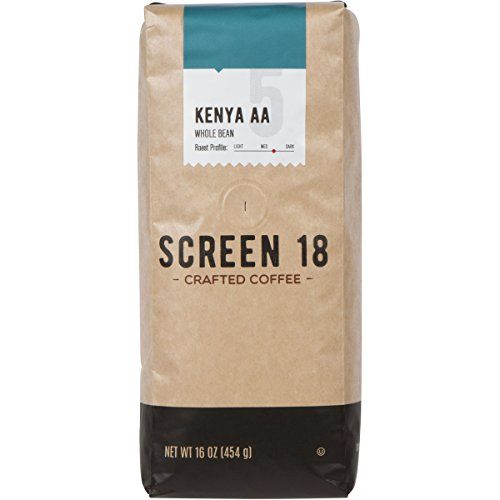
|
Screen 18 Kenyan AA Single Origin Coffee |
|
 See on Amazon
See on Amazon
|
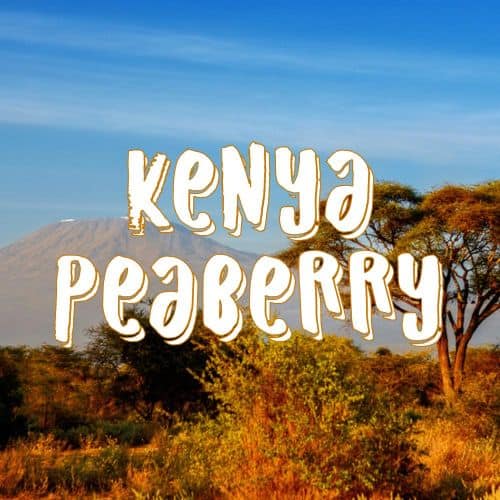
|
Volcanica Kenya Peaberry |
|
CLICK TO CHECK PRICE |
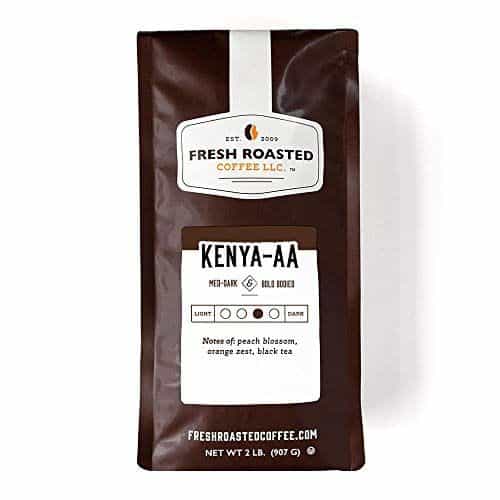
|
Fresh Roasted Coffee LLC Kenya AA Nyeri Ichamara Coffee |
|
 SEE ON AMAZON
SEE ON AMAZON
|

- Bean type: Arabica
- Best for: French press
- Ground or whole: Whole

- Bean type: Arabica, peaberry
- Best for: Aeropress
- Ground or whole: Ground, whole

- Bean type: Arabica
- Best for: French press
- Ground or whole: Whole bean
Kenyan growing conditions
Like so many of the world’s great coffee-growing regions, a large part of the bean quality comes down to the natural environment. You can find the main areas for coffee production between Mt. Kenya and Nairobi. The elevation, rich volcanic soil, and consistent temperatures are perfect for growing coffee of high quality. One thing that differentiates Kenya from some of the other growing regions is the lack of shade. While shade-grown beans are often sought after, Kenya’s full sun leads to the unique flavor profile you’ll find here.
However, it’s not all simply the blessing of geography. The country is known for its highly organized cooperatives system that supports farmers from start to finish, including growing, harvesting, processing, and selling at an auction. The government-run auctions, which have been running since the 1930s, have a transparent pricing system that encourages farmers to concentrate on quality rather than quantity (1).
Finally, there is the coffee processing itself. Kenya, along with a few other countries, uses a method known as double-wash processing or double fermenting. As the name suggests, this means that the beans are soaked and fermented for a second time before drying. The process is more time-consuming and, of course, uses more water, but results in a cleaner, crisper taste in your cup of coffee (2).
What do the grades mean?
While most countries grade their beans, there is no standard system worldwide. Kenyan coffee beans are graded on size only, which is done when the coffee bean is still green, before roasting. The grading will usually determine the price they fetch at auction.
Coffee grading is critical to cup quality and determining coffee value, but isn’t often explored outside the trade.
Thompson Owen, Sweet Maria’s
In Kenya, coffee grades are AA, AB, C, PB, and E. Kenyan AA coffee beans are considered the highest quality and are equivalent to a size 18 screen. AB is the next smallest, followed by a C grade. E and PB are set aside for different types of beans. E stands for elephant beans, which are technically the largest, consisting of two seeds that have grown together. PB is reserved for peaberries, a genetic defect in which a single small coffee bean grows instead of the two halves typically found (3).
What to expect from Kenyan coffee
Kenyan coffee is widely considered to be some of the best in the world. But what exactly does that mean when it comes to drinking it? One of the most common words you’ll hear when used to talk about the flavor is juicy.
Strong black currant notes are particular to the country’s coffee, but you’ll also taste citrus, red berries, and occasionally chocolate or nuttier notes. Due to the high elevations that the beans are grown at, they tend to have higher acidity levels. This is a bright acidity that presents as citrus or white-wine flavors. If acidity isn’t quite your thing, check out our guide to some of the best low-acid coffee.
When it comes to turning your Kenyan beans into your daily cup of coffee, immersion methods are recommended. French press, AeroPress, or even cold brew will provide a brew with a full body while allowing the floral and fruit flavors to open up.
The verdict
If you’re a fan of bright, fruity flavors in your cup of joe, Kenyan coffee will be right up your alley. Any of the coffees on this list will give you a delicious introduction to the country’s coffee, but we’d recommend starting with the Volcanica Kenyan Peaberry. Not only is the flavor profile highly typical of Kenyan coffee, but it’s also an opportunity to get peaberry beans at a good price.
FAQs
Kenyan coffee is expensive due to its high quality. The labor-intensive growing and harvesting and the double wash processing method are used to add to the cost.
Kenyans make their coffee in a tall brass kettle over a charcoal stove. Kahawa Chungu includes ginger, cardamom, and cinnamon and is considered an aphrodisiac. Despite the higher quality coffee produced here, the majority of the population drinks tea.
Kenyan coffee is predominately Arabica beans, though the country does grow some Robusta crops.
- Kenya. (n.d.). Retrieved from https://www.coffeehunter.com/coffee-country/kenya/
- Clean, crisp & Consistent: Kenya’s DOUBLE FERMENT PROCESS. (2016, December 14). Retrieved March 16, 2021, from https://www.fivesenses.com.au/blog/clean-crisp-consistent-kenyas-double-ferment-process/
- Coffee grading system in Kenya. (n.d.). Retrieved from https://mareterracoffee.com/en/blog/coffee-grading-system-in-kenya

